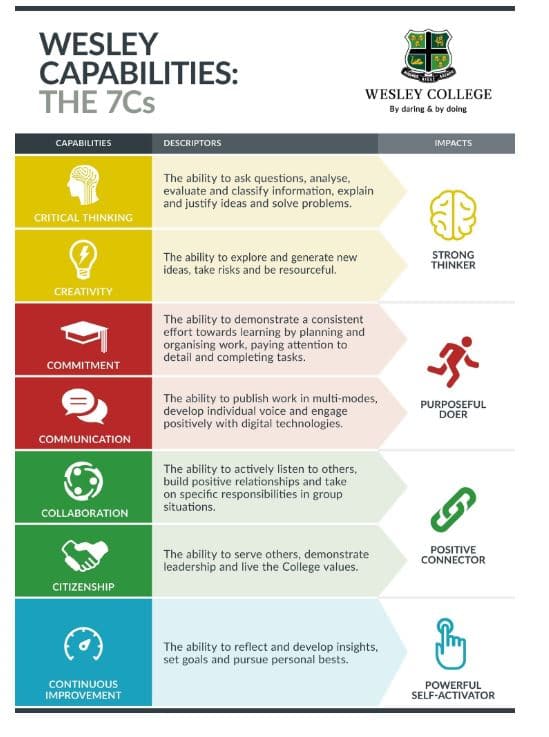By Mathew Irving, Director of Strategy at Wesley College
Parents and teachers appear to be facing ever-increasing pressures to help children lead successful lives, clouded by an uncertain future. It seems that every time we turn on the TV or radio, read an article or follow a social media thread, we are being told that we need to improve the learning and life outcomes of our children.
Parents are expected to help their children develop resilience, joyfulness, and respect, and in turn hope that schools deliver programs that build life-long skills, characteristics and behaviours that enable children to flourish. These pressures co-exist alongside high-stakes testing such as NAPLAN and WACE examinations. So what is truly important? What should we be teaching our children? What skills actually matter now and into the future? How will we ensure our children are successful?
Establish the Meaning of Success
Life-long success is not a fixed state nor is it ever complete. It is not homogeneous and looks different for every child as they move through the phases of their school life and beyond. Success for one child might be obtaining an ATAR score of 82; for another, being selected for the 2nds basketball team, mastering a musical instrument or taking a risk to try something new. Beyond the formal years of schooling, success might be following the pathway of a chosen career, developing a positive network of friends or starting a family.
At school, the pursuit of success should be about personal best. It should be about active participation, perseverance and the desire for excellence. It should be about setting goals and working hard to achieve them. Equally, it should be about developing worthwhile skills that are transferable from one learning experience to another.
Success looks different for all of us and is hard to measure at a given point during the years of schooling. In fact, it is more likely that at the age of 28 or 58 one looks back on their schooling, their career, their life, and determines whether or not they have been successful.
At Wesley, we believe that holistic success is about students becoming Strong Thinkers, Purposeful Doers, Positive Connectors and Powerful Self-Activators. These transformational goals allow our children to successfully navigate an ever-changing and complex world. They allow each child to understand their own definition of success and ensure they are equipped with the skills that allow them to experience success, whatever that may be.
The 7Cs
This year, the College launched the Wesley Capabilities or the 7Cs. These are seven capabilities that develop the necessary skills children need to meet the transformations we wish to see in all of them.
- Critical Thinking
- Creativity
- Commitment
- Communication
- Collaboration
- Citizenship
- Continuous Improvement
They are based on national and global models such as the Organisation for Economic Co-operation and Development’s Future of Education and Skills competencies, the Australian Curriculum general capabilities and Professors Guy Claxton’s and Bill Lucas’s seven competencies for student success.

Why are the 7Cs Important?
In addition to the important development of literacy and numeracy skills and specific subject knowledge, understandings and skills; these capabilities allow our children to apply skills in a variety of learning situations. Be it during an English lesson, on the sporting field or in drama production, these capabilities are relevant and accessible for all children. However, these capabilities only have meaning when they are applied to a learning experience or subject.
To illustrate, in Science children develop their ‘critical thinking’ by asking questions, analysing data and justify their thinking. In Music, children develop their ‘creativity’ by generating new ideas when composing a piece of music. In all learning, children show ‘commitment’, consistent effort and hard work to meet the expectations of their teachers. In English and Languages, children develop their ‘communication’ skills as they work in different modes and develop their personal language skills. In Physical Education, children develop ‘collaboration’ skills as they engage in team sports and respond positively to each other. In service activities, children develop ‘citizenship’ when taking on leadership roles and responding in service to others. Lastly, all children develop a ‘continuous improvement’ mindset. One that allows them to reflect on their past learning, set new goals and pursue personal best in all that they do.
These capabilities are complementary. One informs the other; however, they are distinctly different and should be measured in different ways. Some are deeply connected to the academic classroom, some to experiences in sports’ and arts’, and some are based on interactions between students and teachers. Therefore, they require different levels of acquisition, measurement and value depending on the nature of the learning activity.
These capabilities are not only relevant in a schooling context, but in a life context. As the average 15-year-old is likely to experience a portfolio of careers and the advent of automation eliminates some jobs; our children will need skills that are transferable in life. As the nature of ‘learning on the job’ increases; the level of problem-solving and critical analysis of information, collaboration and use of digital tools will grow exponentially. The Wesley Capabilities will prepare our children for a life of success by paying attention to what matters, rather than just what we can measure.
What Can You Do Next?
I would encourage you to speak with your children about the 7Cs. Perhaps around the dinner table, ask them how they applied one of the capabilities in their learning during the day. Perhaps reflect on how you used one of the 7Cs in your day and in doing so, you too will demonstrate what is important for your child’s ongoing success now and in the years ahead.
Subscribe to Wesley College News & Events